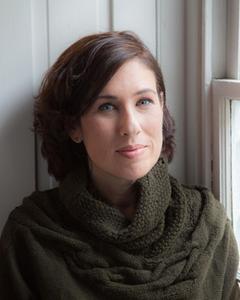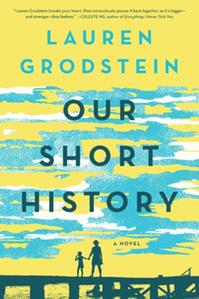
|
|
| photo: Ken Yanoviak | |
Lauren Grodstein has written four novels, including A Friend of the Family and The Explanation for Everything. Her new one is Our Short History (see our review below). Her essays, stories and articles have been published in Gourmet, the New York Times and the Washington Post. She is an associate professor of English and directs the MFA program at Rutgers University-Camden; she lives in New Jersey with her husband, son and dog.
Our Short History is a poignant novel-as-letter from Karen, a dying mother, to her little boy. You have a young son. Was writing this novel more emotional for you than your first three books?
You know, I manage to get pretty worked up no matter what I write, simply because writing a novel is such an intense process. That said, I certainly felt emotional while thinking about the women I knew who inspired the novel. In trying to wrestle with Karen's illness, for instance, I read a letter from an acquaintance of mine, a wonderful poet, that she wrote to her husband at the very end of her life. She wanted him to know how much she loved him and their young children, and how they'd made her short life worthwhile. That letter utterly did me in.
Your novel smoothly incorporates details of ovarian cancer and end-of-life planning, while not losing the sense that this is a very personal missive to Karen's son. How did you research?
I always begin my research by reading. For Our Short History, the first thing I read was a wonderful book called Memoir of a Debulked Woman by Susan Gubar, an English professor. She was unsentimental and unsparing about the details of her treatment (hair loss, exhaustion, panicked trips to the bathroom, despair, unexpected moments of humor). I also talked to some doctors I knew, and the doctors they referred me to, about what a young, otherwise healthy woman's prognosis would be, and what her treatment would likely look like.
But the research that affected me most was talking to ovarian cancer patients and the people ovarian cancer left behind. My sister-in-law's family has been struck by ovarian cancer again and again, and she was so generous and insightful when she talked to me about the disease, and what it means to fight through it. The book was inspired, in part, by her family and their fight.
The novel has a sense of immediacy, because of the letter format. Did you try other approaches to the story?
I didn't. The novel just wanted to be addressed to Jake. Karen was writing for him and only for him. And I think, because she didn't see herself as a novelist, really, she would never have set out to write a novel if it weren't something written specifically for her son.
How do you feel about your character Ace, in light of the current political atmosphere? Would you have written him any differently in light of the 2016 election?
Ace seems like such an innocent now. He's kind of a slimeball, a low-level New York City politician who made his way up the power chain by slapping backs and making backroom deals. He was also sleeping with any young girl he could get his hands on. But, hey, he never grabbed anyone by the pussy, never stiffed his workers or contractors, never lied to his constituents, never filed for bankruptcy, never claimed close to a billion-dollar loss on his taxes and never conspired with any Russians. His worst crime was hurting someone he loved. Doesn't that seem quaint? I don't know, had I written him after Trump's election, if I would have written him differently--I just might not have written him at all. The idea of writing about politics is much less appealing now than it was when I started this book in 2012. Karen is so multi-dimensional: selfless mom, savvy political consultant, conscientious daughter, yet initially flawed in her resentment of Jake's father. Was it challenging to balance these characteristics to come up with a really credible protagonist?
Karen is so multi-dimensional: selfless mom, savvy political consultant, conscientious daughter, yet initially flawed in her resentment of Jake's father. Was it challenging to balance these characteristics to come up with a really credible protagonist?
I always imagine my characters as real people, people who are good and bad, selfish and selfless, full of good humor and self-doubt and ambition and anger. Karen is certainly all that, or at least that's how I envision her.
Actually, what was most important to me was to make Karen something besides her illness. I think we often treat people with incurable diseases or other physical ailments as somehow other, as if they didn't live among us, as if they might not be us one day. Karen is funny and smart and angry and loving and happens to be a terminal cancer patient. And I think you can see, in the book, how people treat her gingerly, as though she's somehow a little bit less legitimate because she's dying.
The cover is perfect. Did you contribute to it?
Don't you love it? I love it. My agent suggested the mother and son outline on the bottom of the image, which I think makes the whole thing come together. But I had nothing to do with it. I'm actually not a very visual person, so I can never come up with good cover ideas beyond "please don't make it a sexy picture of a woman's legs."
What are you reading and recommending these days?
I've been reading some wonderful books lately--anything to take my mind off the news. I loved Nathan Hill's The Nix, and A Separation by Katie Kitamura, and I also read Brad Watson's Miss Jane, which I want to mention here because I want more people to read it. It was so lovely!
You direct the Rutgers University-Camden creative writing MFA program. How do you balance home and work and writing?
I think there are two things that help me get it all done. The first is that, by nature, I'm very jittery. It's hard for me to sit still. From the moment I open my eyes, I'm doing something, washing dishes or making lunches or folding laundry or answering e-mails or, on the best days, writing. I basically don't stop until I pass out at night, although I pass out pretty early, since I've been so damn jittery all day.
The second thing is that by inclination and location (I live in southern New Jersey), I don't go to a lot of parties, I don't do a lot of networking, and I don't participate in any kind of real literary social life outside what I do for my job. While this can be sad for me sometimes--I like going to readings, for instance, and even enjoy an occasional party--the truth is I'm a homebody, and I don't have a lot of distractions.
Oh, and I guess the third thing--there's a third thing!--is that I like all of the different things I do, for the most part (even the laundry folding, since that's when I treat myself to Internet reruns of Samantha Bee). It's not hard to get stuff done when you like what you're doing. And believe me, I know how lucky I am to be able to say that. If there's one thing writing this novel has taught me, it's that I'm a lucky person to be here, to be with my friends and family, to be folding the laundry, to be alive. --Cheryl Krocker McKeon, manager, Book Passage, San Francisco

